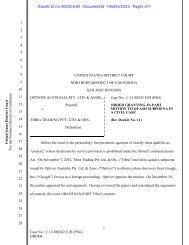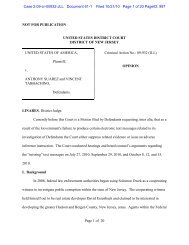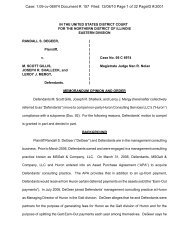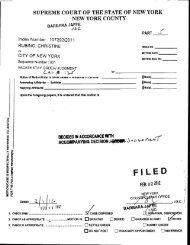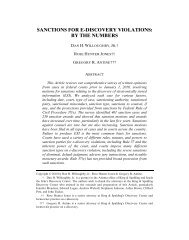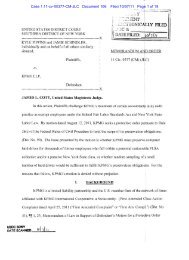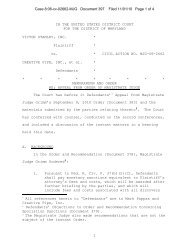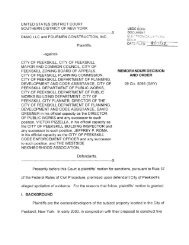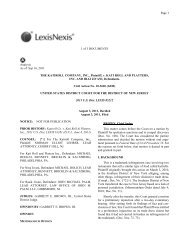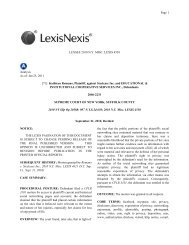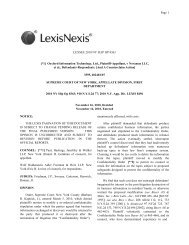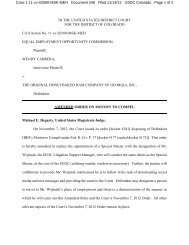Rimkus Consulting Group Inc. v. Cammarata - Ballard Spahr LLP
Rimkus Consulting Group Inc. v. Cammarata - Ballard Spahr LLP
Rimkus Consulting Group Inc. v. Cammarata - Ballard Spahr LLP
You also want an ePaper? Increase the reach of your titles
YUMPU automatically turns print PDFs into web optimized ePapers that Google loves.
Case 4:07-cv-00405 Document 450 Filed in TXSD on 02/19/10 Page 15 of 139<br />
faith. 11 The First, Fourth, and Ninth Circuits hold that bad faith is not essential to imposing<br />
severe sanctions if there is severe prejudice, although the cases often emphasize the presence<br />
of bad faith. 12 In the Third Circuit, the courts balance the degree of fault and prejudice. 13<br />
11<br />
See, e.g., Turner v. Pub. Serv. Co. of Colo., 563 F.3d 1136, 1149 (10th Cir. 2009) (“Mere negligence in<br />
losing or destroying records is not enough because it does not support an inference of consciousness of a<br />
weak case.” (quoting Aramburu v. Boeing Co., 112 F.3d 1398, 1407 (10th Cir. 1997))); Faas v. Sears,<br />
Roebuck & Co., 552 F.3d 633, 644 (7th Cir. 2008) (“In order to draw an inference that the [destroyed<br />
documents] contained information adverse to Sears, we must find that Sears intentionally destroyed the<br />
documents in bad faith.”); Greyhound Lines, <strong>Inc</strong>. v. Wade, 485 F.3d 1032, 1035 (8th Cir. 2007) (“A<br />
spoliation-of-evidence sanction requires ‘a finding of intentional destruction indicating a desire to suppress<br />
the truth.’” (quoting Stevenson v. Union Pac. R.R. Co., 354 F.3d 739, 746 (8th Cir. 2004))); Wyler v. Korean<br />
Air Lines Co., 928 F.2d 1167, 1174 (D.C. Cir. 1991) (“Mere innuendo . . . does not justify drawing the<br />
adverse inference requested . . . .”).<br />
12<br />
See, e.g., Hodge v. Wal-Mart Stores, <strong>Inc</strong>., 360 F.3d 446, 450 (4th Cir. 2004) (holding that an inference<br />
cannot be drawn merely from negligent loss or destruction of evidence but requires a showing that willful<br />
conduct resulted in the loss or destruction); Silvestri v. Gen. Motors Corp., 271 F.3d 583, 593 (4th Cir. 2001)<br />
(holding that dismissal is “usually justified only in circumstances of bad faith” but “even when conduct is less<br />
culpable, dismissal may be necessary if the prejudice to the defendant is extraordinary, denying it the ability<br />
to adequately defend its case”); Sacramona v. Bridgestone/Firestone, <strong>Inc</strong>., 106 F.3d 444, 447 (lst Cir. 1997)<br />
(“Certainly bad faith is a proper and important consideration in deciding whether and how to sanction conduct<br />
resulting in the destruction of evidence. But bad faith is not essential. If such evidence is mishandled through<br />
carelessness, and the other side is prejudiced, we think that the district court is entitled to consider imposing<br />
sanctions, including exclusion of the evidence.”); Allen Pen Co. v. Springfield Photo Mount Co., 653 F.2d<br />
17, 23–24 (1st Cir. 1981) (“In any event, Allen Pen has not shown that the document destruction was in bad<br />
faith or flowed from the consciousness of a weak case. There is no evidence that Springfield believed the lists<br />
would have damaged it in a lawsuit. Without some such evidence, ordinarily no adverse inference is drawn<br />
from Springfield’s failure to preserve them.”); Glover v. BIC Corp., 6 F.3d 1318, 1329 (9th Cir. 1993) (“Short<br />
of excluding the disputed evidence, a trial court also has the broad discretionary power to permit a jury to<br />
draw an adverse inference from the destruction or spoliation against the party or witness responsible for that<br />
behavior.”).<br />
13<br />
See, e.g., Bensel v. Allied Pilots Ass’n, No. 02-2917, 2009 WL 4884052 (D.N.J. Dec. 17, 2009)<br />
(declining to apply a spoliation inference or other sanction for the loss of information resulting from the<br />
defendant’s failure to impose litigation holds in a timely manner); Mosaid Techs. <strong>Inc</strong>. v. Samsung Elecs. Co.,<br />
348 F. Supp. 2d 332, 335 (D.N.J. 2004) (noting that “[t]hree key considerations that dictate whether such<br />
sanctions are warranted are: ‘(1) the degree of fault of the party who altered or destroyed the evidence; (2)<br />
the degree of prejudice suffered by the opposing party; and (3) whether there is a lesser sanction that will<br />
avoid substantial unfairness to the opposing party and, where the offending party is seriously at fault, will<br />
serve to deter such conduct by others in the future’” and holding that bad faith was not required for an adverse<br />
inference instruction as long as there was a showing of relevance and prejudice (quoting Schmid v. Milwaukee<br />
Elec. Tool Corp., 13 F.3d 76, 79 (3d. Cir. 1994))).<br />
15



